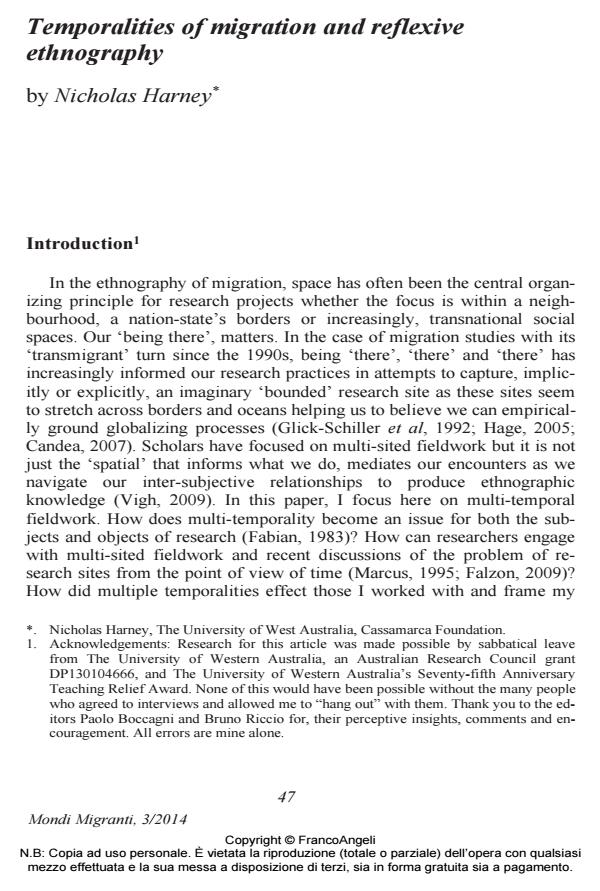Temporalities of migration and reflexive ethnography
Journal title MONDI MIGRANTI
Author/s Nicholas Harney
Publishing Year 2015 Issue 2014/3
Language Italian Pages 16 P. 47-62 File size 57 KB
DOI 10.3280/MM2014-003003
DOI is like a bar code for intellectual property: to have more infomation
click here
Below, you can see the article first page
If you want to buy this article in PDF format, you can do it, following the instructions to buy download credits

FrancoAngeli is member of Publishers International Linking Association, Inc (PILA), a not-for-profit association which run the CrossRef service enabling links to and from online scholarly content.
In the past several decades ethnographers have struggled to find the methodological postures appropriate for what seems to be an intensely globalising world, and for there has been a very productive opening up of space in research analysis. In this article, I examine a second dimension that I think ethnographers of migration should consider: time. Ethnographers must confront the co-existence of multiple temporalities in the intensive on-the-ground learning in the intimate sites of inter-subjective communication of fieldwork. I classify three different temporalities at stake in the migration process: indeterminacy, chronology and convergence. I concentrate on Italy as a terrain of disparate migratory projects and temporal junctures and what the implications of these different zones of engagement mean methodologically for anthropological fieldwork. Migration research necessarily calls upon other places and other times both in terms of how those ethnographic practices are enacted and in the production of knowledge. I draw upon Fabian’s challenge to ethnographers to analyse both the reflexive dilemmas for an researchers studying mobility through a nation-space and how that research is informed by other places, other times.
Keywords: Temporality, fieldwork, ethnography, migration, Italy.
- ‘You just get used to waiting’: Exploring the temporal dimensions of in-country educational experiences Kate Naidu, in Time & Society /2023 pp.169
DOI: 10.1177/0961463X231157883 - Permanent Precarities: The Experience of Temporality of Tunisian Migrants in Sicily’s Transformed Agricultural Strip Andrea Calabretta, in Journal of International Migration and Integration /2025
DOI: 10.1007/s12134-025-01326-1
Nicholas Harney, Temporalities of migration and reflexive ethnography in "MONDI MIGRANTI" 3/2014, pp 47-62, DOI: 10.3280/MM2014-003003